Scoop: Prince Andrew's infamous BBC interview... as dramatised by Netflix
- Published
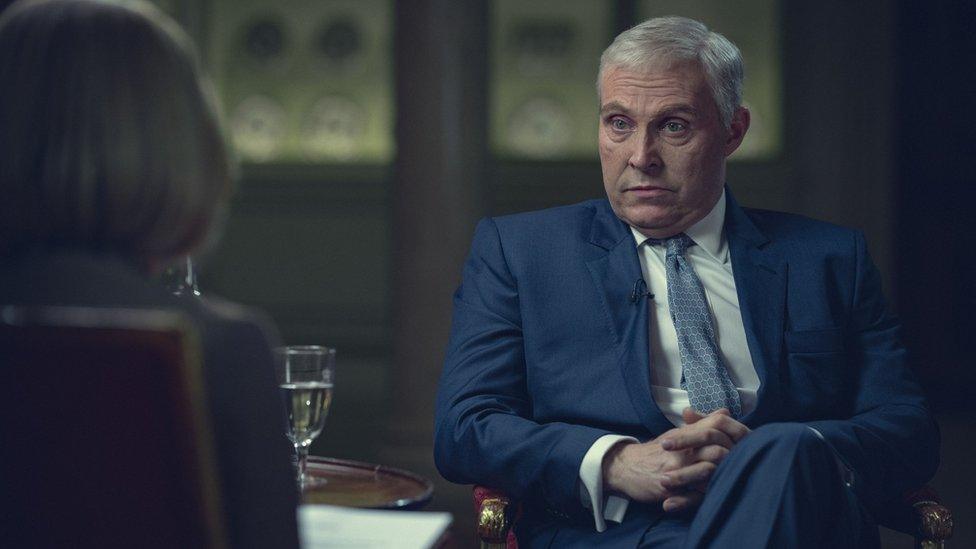
Rufus Sewell plays Prince Andrew in Scoop, the Netflix account of the famous Newsnight interview
This was the Rolls-Royce of car crash interviews. A purring engine of privilege collided with a barrage of perfectly timed questions.
It used to be said that history is written by the winners. Now it's the Netflix script.
A new film, called Scoop, is an account of Prince Andrew's downfall on a special Saturday evening edition of the BBC's Newsnight programme in 2019. And it is told from the perspective of those who got this famous interview, which can still be watched in full on the BBC iPlayer.
Specifically, it's the story of the producer Sam McAlister, who wrote the book and now, played by Billie Piper and appearing with the celebs at the glitzy premieres, has made the leap to being Sam Mc A-lister.
The Netflix film pushes into the foreground some of those who make the news but without getting much credit - the behind-the-scenes producers and those who do the legwork of booking guests.
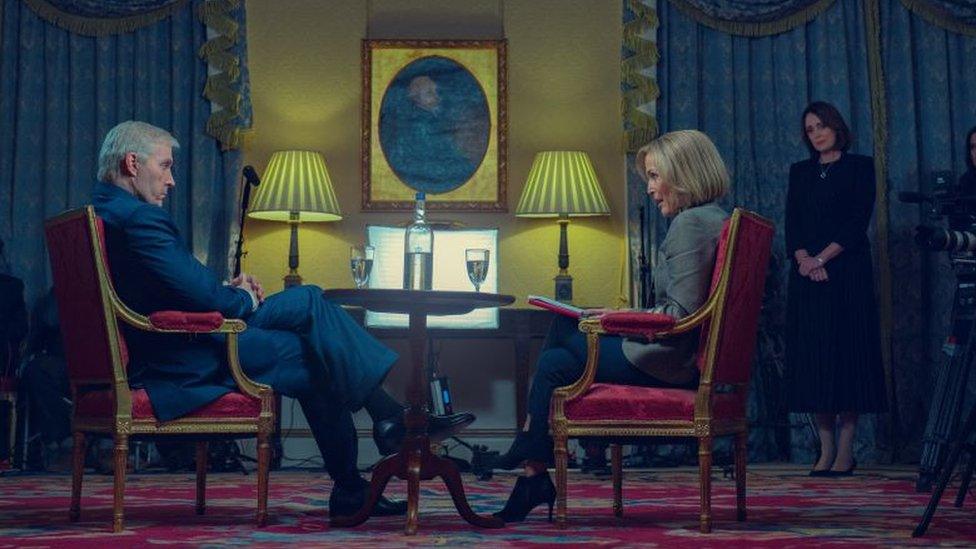
In the film...
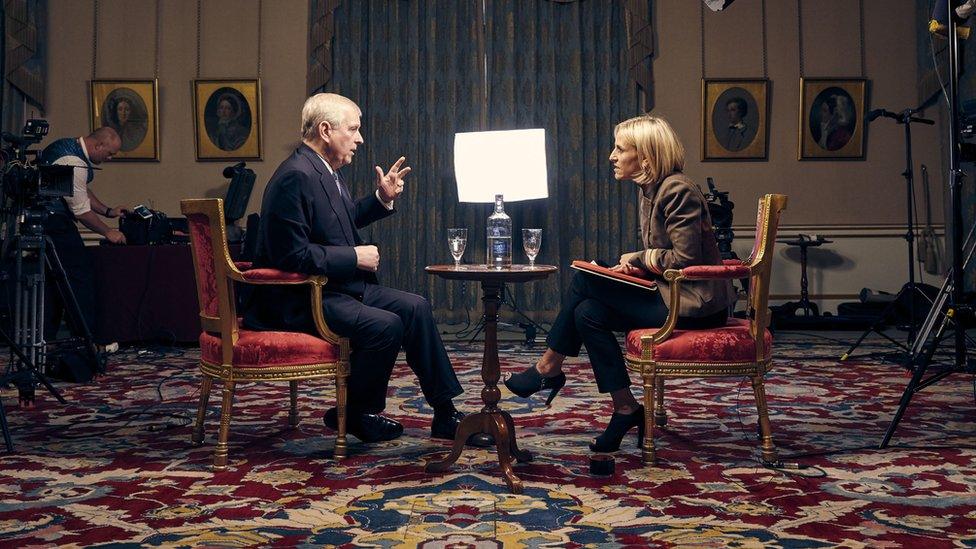
... and in real life
But at the very centre of this film is Prince Andrew, played with fleshy self-absorption by Rufus Sewell. And this account won't improve the Duke of York's already battered reputation.
He comes across as needy, lacking in self-awareness, and emotionally dependent on his mother the late Queen and his private secretary, Amanda Thirsk, who becomes the link for Sam McAlister to secure the interview.
The prince's private secretary speaks protectively of him: "Too loyal for his own good sometimes." And the film captures that rather stifling, self-regarding, claustrophobic palace world, which completely falls apart when confronted with Emily Maitlis's politely brutal questioning.
Actor Rufus Sewell has said he used the character of David Brent, the deluded but endlessly hopeful manager from the Office, as a reference point.
This film shows the prince rehearsing for the Buckingham Palace interview, but it doesn't explain the logic of answers that will forever associate him with going for a pizza in Woking - "a very unusual thing for me to do" - and the "peculiar medical condition" that meant he couldn't sweat.
More to the point he couldn't really convincingly express regret - and that 49 minute interview, and the questions it raises about links to Jeffrey Epstein, continues to haunt him and the Royal Family every time he appears in public.
Watch the 2019 Prince Andrew interview that inspired Scoop
But rather like The Crown, Netflix's other royal drama based on real life, it's likely to raise questions about the blurred boundaries between drama and documentary.
There's an on-screen disclaimer that "certain elements have been fictionalised for dramatic purposes" - but it might be hard for viewers to separate what was from the original interview and the moments of dramatic licence that have been added.
Prince Andrew is seen getting cross with palace staff about wrongly rearranging his teddy bears. It's a neat piece of storytelling about failing to see the bigger picture, but is that one of the "fictionalised for dramatic purposes" scenes that didn't really happen?
At a pre-launch screening, one of the biggest audience reactions was when Rufus Sewell as Prince Andrew turns to see Gillian Anderson as Emily Maitlis entering the room ahead of the interview, dressed for battle.
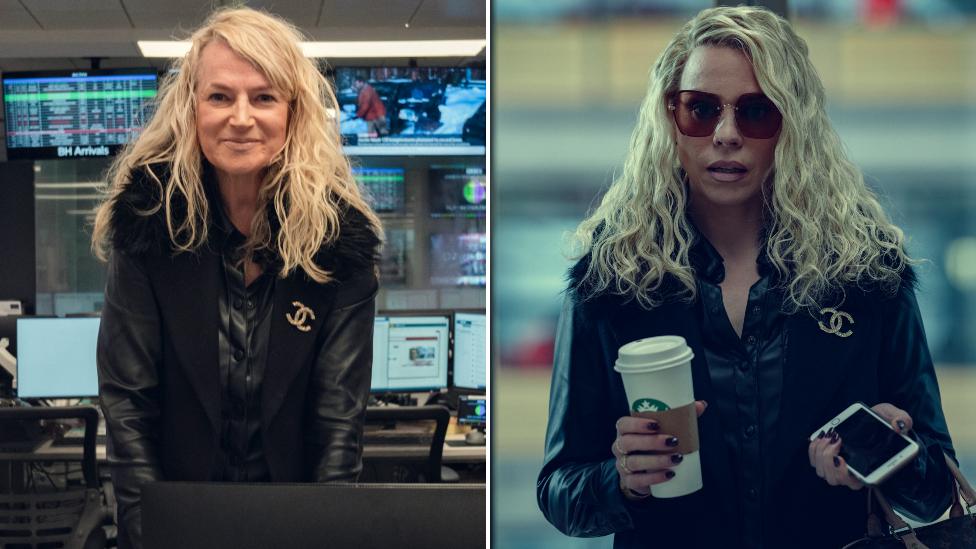
Sam McAlister is played in the film by Billie Piper
"Trousers," exclaims the Prince Andrew character, with a fruity harrumph, as though taken aback by a female interviewer wearing trousers. It seemed to encapsulate a sense of underlying sexism and being hopelessly out of date.
Except in a questions and answers session after the screening, McAlister was asked if Prince Andrew had really said that - and she said she hadn't heard him say it.
Would the viewer know the difference between the actual words, in the meticulously recreated interview, and the parts which are dramatic devices? Is that fair?
Maitlis herself, in real life rather than as played by Anderson, talked in 2019, before the interview, about the importance of timing in such on-screen interrogations.
"If you interrupt somebody too early, if you miss it and don't interrupt at all, that's the difference between a good interview and a bad interview. It's about the absolute moment," she said.
But it's not a particularly sympathetic portrayal of the TV interviewer. Anderson previously played Margaret Thatcher in The Crown - and with a performance full of husky, haughty froideur, this can oddly feel like Thatcher playing Emily Maitlis.
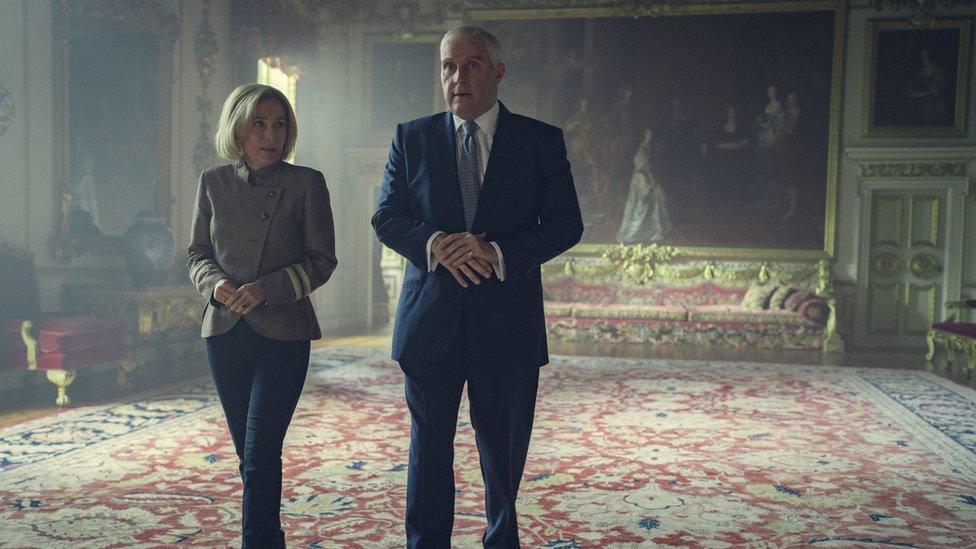
The film carefully recreates the Newsnight interview from 2019
The hierarchies of BBC News are also questioned. The senior staff in Newsnight are depicted as out of touch, patronising and part of the entitled chattering classes, when they're berated by McAlister for "mistaking talking to ourselves for news".
But Scoop is intended as a celebration of holding power to account. And going into the BBC's headquarters McAlister is seen giving a "Good morning George" to the statue of another ex-BBC staffer, George Orwell.
If the 102-minute film is about the voices of those usually ignored, another part of this story is the seriousness of the backdrop and the real-life people portrayed or referred to in the film.
The claims about Jeffrey Epstein and his connections continue to spill out and show no signs of going away. Ghislaine Maxwell, mentioned in passing in the film, is in prison for sex trafficking offences.
One of Epstein's victims, Virginia Giuffre, whose photograph with Prince Andrew was discussed in the interview, reached a settlement with the prince - who accepted no liability and has always strongly denied any wrongdoing. The film says this is for a "reported £12m" although the actual amount has never been made public.
This still remains a current story and not just capturing a moment in journalism history.

You can see more royal stories in the free BBC Royal Watch newsletter emailed each week - sign up here from within the UK or here, from outside the UK., external